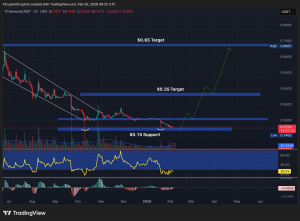Last updated:
 Why Trust Cryptonews
Why Trust Cryptonews

A U.S. federal grand jury has indicted nine individuals for their involvement in a crypto-based money laundering network tied to drug cartels in Mexico and Colombia.
The operation, active between 2020 and mid-2023, used cryptocurrencies to launder proceeds from drug sales in the United States, transferring funds across borders under the guise of legitimate transactions.
The charges stem from a multi-agency investigation involving Homeland Security Investigations (HSI), the IRS Criminal Investigation Unit, and the Broward County Sheriff’s Office.
The defendants face allegations of conspiracy to commit money laundering and operating an unlicensed money transmission business.
Crypto Laundering Operation: How the US Was Able to Arrest Drug Cartels
According to the official press release, the scheme unraveled by U.S. authorities was a complex network designed to funnel drug money through cryptocurrencies into the hands of cartel leaders in Mexico and Colombia.
At its core, the operation involved the collection of bulk cash from drug sales in U.S. cities.
This cash was exchanged for cryptocurrency, sent to wallets controlled by the defendants or their co-conspirators, and then converted back into fiat currency for delivery to cartel leaders.
Key individuals in the operation include Nilson Sneyder Vasquez Duarte (known as “Sobri” or “Sobrino”), who coordinated the delivery of funds to black-market cryptocurrency exchangers.
Other accused participants include Hernan Horacio Richard Samper, Maria Eugenia Landeros Rosas (alias “Yeni”), Raimundo Carlos Rodriguez Huter, and several others who allegedly facilitated the exchanges and acted as couriers transporting cash across U.S. cities.
Court documents allege that the network relied on black-market exchangers, unlicensed money transmitters, and cryptocurrency wallets to obfuscate the origins of the funds.
This method offered the cartels a modern way to evade traditional financial scrutiny.
The operation effectively masked the money trail by converting cash to cryptocurrency and utilizing decentralized exchanges and mixers.
While the defendants are charged with multiple counts, including conspiracy to commit money laundering, seven of them—Duarte, Landeros, Huter, Rincon, Morales, Calvo Bueno, and Alvarez—also face substantive money laundering charges.
Tackling Crypto-Led Financial Crime: A New Approach
Cryptocurrencies’ borderless nature, coupled with transaction anonymity, has made them an attractive alternative for criminal enterprises.
The U.S. Department of Justice (DOJ) highlighted this case as part of its broader efforts under the Organized Crime Drug Enforcement Task Forces (OCDETF) initiative.
OCDETF adopts a multi-agency, intelligence-driven approach to dismantle high-level drug trafficking and money laundering operations.
In this instance, the investigation, led by the El Dorado Task Force, builds on three individuals’ prior convictions and ongoing cases against others.
The agencies involved—HSI, IRS Criminal Investigation, and local law enforcement—employed sophisticated forensic techniques to trace the cryptocurrency transactions back to their sources.
Amid this growing misuse of Crypto, Nepal’s Financial Intelligence Unit (FIU) has recently flagged a rising trend of cryptocurrencies being used for money laundering and cyber fraud despite a nationwide ban on digital asset trading.
In its latest “Strategic Analysis Report,” the FIU highlighted how bad actors convert illicit funds into cryptocurrencies to transfer them offshore.
The rise of fraudulent crypto investment schemes targeting Nepalese citizens and underreporting due to the illegality of trading and social stigma has further exacerbated the issue.
Nearly 65% of fraud cases reported in Nepal by mid-2024 were cyber-enabled, prompting the FIU to recommend stricter monitoring of crypto transactions, enhanced institutional training, and public awareness campaigns.

















